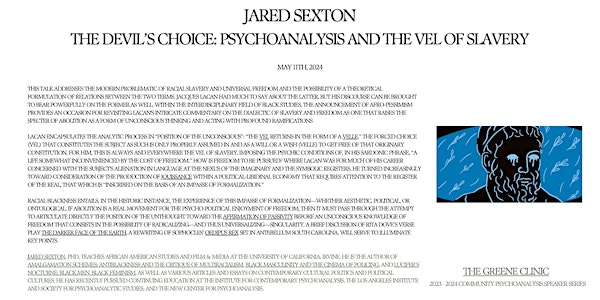This talk addresses the modern problematic of racial slavery and universal freedom and the possibility of a theoretical formulation of relations between the two terms. Jacques Lacan had much to say about the latter, but his discourse can be brought to bear powerfully on the former as well. Within the interdisciplinary field of Black Studies, the announcement of afro-pessimism provides an occasion for revisiting Lacan's intricate commentary on the dialectic of slavery and freedom as one that raises the specter of abolition as a form of unconscious thinking and acting with profound ramifications.
Lacan encapsulates the analytic process in “Position of the Unconscious”: “The vel returns in the form of a velle.” The forced choice (vel) that constitutes the subject as such is only properly assumed in and as a will or a wish (velle) to get free of that originary constitution. For him, this is always and everywhere the vel of slavery, imposing the psychic conditions of, in his sardonic phrase, “a life somewhat inconvenienced by the cost of freedom.” How is freedom to be pursued? Where Lacan was for much of his career concerned with the subject's alienation in language at the nexus of the imaginary and the symbolic registers, he turned increasingly toward consideration of the production of jouissance within a political-libidinal economy that requires attention to the register of the real, that which is “inscribed on the basis of an impasse of formalization.”
Racial blackness entails, in the historic instance, the experience of this impasse of formalization—whether aesthetic, political, or ontological. If abolition is a real movement for the psycho-political enjoyment of freedom, then it must pass through the attempt to articulate directly the position of the unthought toward the affirmation of passivity before an unconscious knowledge of freedom that consists in the possibility of radicalizing—and thus universalizing—singularity. A brief discussion of Rita Dove’s verse play The Darker Face of the Earth, a rewriting of Sophocles’ Oedipus Rex set in antebellum South Carolina, will serve to illuminate key points.
Jared Sexton, PhD, teaches African American studies and film & media at the University of California, Irvine. He is the author of Amalgamation Schemes: Antiblackness and the Critique of Multiracialism, Black Masculinity and the Cinema of Policing, and Lucifer’s Nocturne: Black Men, Black Feminism, as well as various articles and essays on contemporary cultural politics and political cultures. He has recently pursued continuing education at the Institute for Contemporary Psychoanalysis, the Los Angeles Institute and Society for Psychoanalytic Studies, and the New Center for Psychoanalysis.
